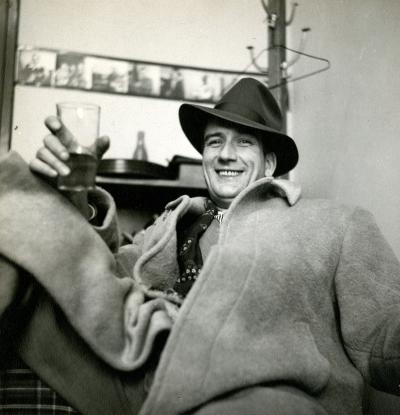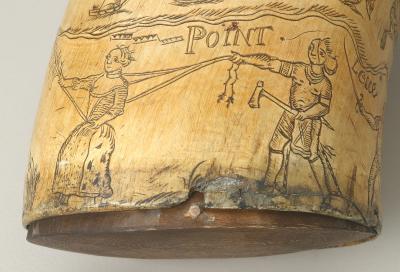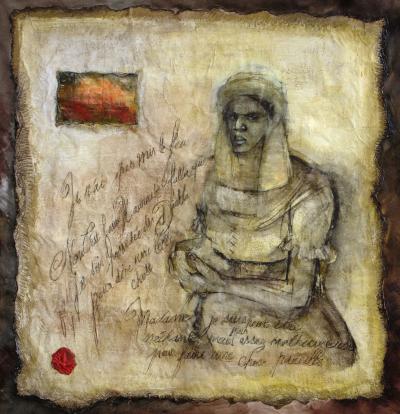From the 1930s onward, relations between Montréal and Rwanda have strengthened and evolved, from missionary work to university programs to a wave of immigration.
Rwanda
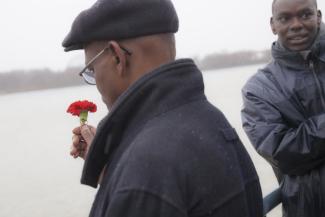
From Montréal to Rwanda, and Rwanda to Montréal
Université nationale du Rwanda
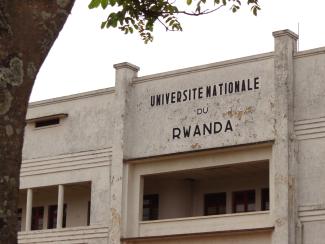
In the early 1960s, ties between Rwanda and Québec strengthened. Québec wanted to develop its relations with France and the French-speaking states of Africa. In the midst of the Quiet Revolution, the province sought to reaffirm the importance of French as an international language and to learn from other French-speaking cultures.
In 1962, Rwanda declared independence from Belgium. With the country’s leadership and administration again in Rwandan hands, there came a need to educate the population for the challenges ahead. At the time, many young Rwandans were leaving the country to pursue an education at universities in the Congo and across Europe. A handful of students also came to Montréal. The Rwandan government asked the Dominicans in Québec to establish a university in Rwanda—symbolic of the ties between the two countries. In 1963, Father Georges-Henri Lévesque, an eminent professor at the Université de Montréal, founded the National University of Rwanda in Butare. Many Montréal professors with no religious affiliations also followed his lead and went to teach in Butare.
Another phenomenon in the 1960s: students from the National University of Rwanda were being offered study opportunities in Montréal and Québec City. Newspaper articles in Montréal papers around this time noted the trend. In 1965, La Presse mentions, for instance, the story of Amri Ismaël, a 22-year old Rwandan student who came to Montréal to study the Canadian prison system. In 1967, the papers reported on a group of future Rwandan librarians who came to Montréal to take library sciences classes at the Université de Montréal’s École de bibliothéconomie. In 1972, a student and future Rwandan prime minister named Faustin Twagiramungu even penned an article in Le Devoir.
Over the next few decades, numerous Rwandan student associations sprung up. The Rwandan community was still quite small, however. In a report from the Ministère de l’Immigration et des Communautés culturelles du Québec in 2001, only 30 Rwandan immigrants said they had arrived in Québec before 1981. In 1989, an article in La Presse estimated that the Rwandan community in Québec included less than 100 people, with around 50 Rwandans located in Montréal. In October 1990, the Québec City newspaper Le Soleil estimated that around 150 people of Rwandan origin were living in the province.
Escaping genocide: Rwandan immigration since 1990
Rwanda - garçon
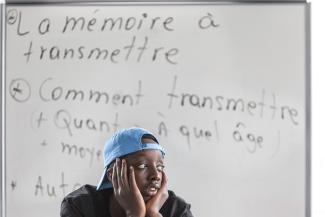
Most Montrealers of Rwandan origin arrived after the 1994 genocide, a traumatic event that caused vast displacement. In the 1990s, violence escalated in Rwanda between the Hutus and the Tutsis. Tensions were rooted in a long colonial history and marked by confrontation. Prior waves of violence in 1959, 1963, and 1973 forced thousands of Tutsi Rwandans to flee to neighbouring countries as refugees. Some fled as far as Europe. In April 1994, years of tension came to a head. Then-president Juvénal Habyarimana was killed during an attack, and the assassination marked the start of a genocide with a staggering death toll—in three months 800,000 Rwandans, mainly Tutsi, lost their lives.
In Montréal and across the province, there was a call for citizens to donate to organizations like Oxfam-Québec and Prodeva-Avions Sans Frontières to support the refugee crisis. Montrealers were asked to prepare to welcome Rwandan refugees to the city. In 2001, seven years after the genocide, 1,725 Rwandans were living in Québec, with 950 in Montréal, mainly in the neighbourhoods of Ahuntsic-Cartierville, Côte-des-Neiges, and LaSalle. In 2006, more than 1,300 Rwandans were living in Montréal.
Numerous integration and reconciliation initiatives have since launched, particularly in cultural centres and through university and community programs. As part of the project Life Stories of Montrealers, for example, individuals displaced by mass violence told their stories to a team of oral history researchers. Through these kinds of initiatives, Rwandans in Montréal have met members of the Armenian, Cambodian, and Jewish communities. Another important organization is the Alliance for Genocide Awareness and Remembrance (AGAR), an organization centred around prevention, raising awareness, and bringing people together. AGAR is made up of the Armenian Genocide Centennial Committee of Canada, the Montréal Holocaust Memorial Centre, Page-Rwanda, and the Ukrainian Information & Anti-Defamation Committee. Their work helps build bridges between people who have lived through unspeakable events, whether they are survivors of the Holocaust, the Khmer Rouge regime, or the Armenian Genocide.
Rwanda 2010
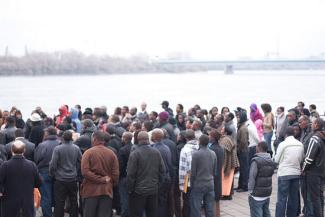
April 7 marks the International Day of Reflection on the Genocide in Rwanda. In Montréal, Page-Rwanda organizes commemorative events each year, including a walk from Berri-UQAM towards the waterfront in the Old Port. The walk is in memory of the thousands of victims thrown into the Nyabarongo River in Rwanda and drowned in 1994. On the commemorative walk, participants each throw a flower into the St. Lawrence to honour the memory of loved ones lost during the genocide. The river becomes a space of memory for members of a community who have built new lives here in Québec, sometimes after decades of exile.
GENDRON, Robin S. « “Le prestige du Canada est en jeu.” Le Père Lévesque et l’Université nationale du Rwanda dans les années 1960 : entre le Canada et le Québec », Globe, vol. 12, no :1, 2009, p. 95-114.
HIGH, Steven. « Embodied Ways of Listening: Oral History, Genocide and the Audio Tour », Anthropologica, no 55, 2013, p. 73-85.
MINKO, Patrick. Le génocide rwandais dans la presse canadienne, Mémoire (M.A.), Université du Québec à Montréal, 2008, 123 p.
ICI RADIO-CANADA. « Génocide au Rwanda : le devoir de mémoire », [En ligne], Ici Grand Montréal, 4 avril 2014.
http://ici.radio-canada.ca/nouvelles/societe/2014/04/04/002-rwanda-genocide-activites.shtml
PERREAULT, Pierre. « Un jeune Rwandais étudie le régime pénitentiaire canadien », La Presse, 23 août 1965, p. 2.
GRANDJEAN, Patrick. « Des Rwandais de Montréal manifestent », La Presse, 13 novembre 1989, p. A-16.
« Pressant appel à la générosité des Québécois », La Presse, 3 août 1994, p. A-4.

